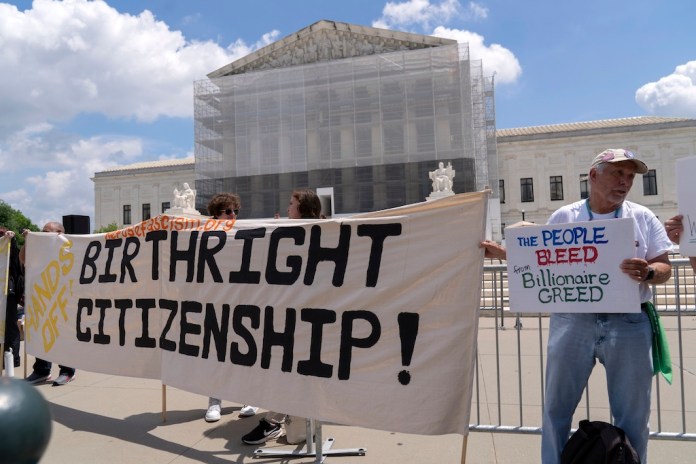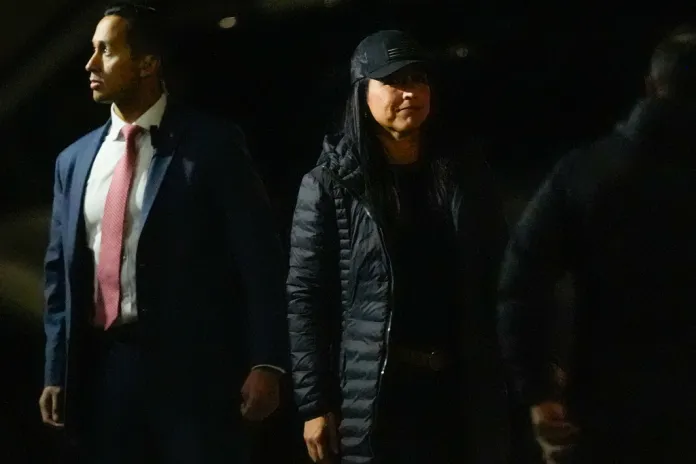Trump’s tariffs face major test before federal appeals court
The article discusses a notable legal challenge facing former President Donald Trump’s broad use of tariffs, which is being reviewed by a full panel of judges at the U.S. Court of Appeals for the federal Circuit. The case centers on whether Trump had the constitutional authority to impose tariffs through executive action under the International Emergency Economic Powers Act (IEEPA) of 1977. This law allows the president to regulate economic activities during declared emergencies. The Trump management argues that emergencies like fentanyl importation and trade deficits justify the tariffs, while opponents claim the law does not clearly grant the president broad powers to impose tariffs, invoking the “major questions doctrine.”
A previous ruling by the U.S. Court of International Trade found Trump’s tariff actions unconstitutional, setting aside those tariffs. The current appeal could potentially reach the Supreme Court. The outcome will impact ongoing U.S. trade policy and diplomatic negotiations, including tariffs on countries like Canada, Mexico, and China. The Justice Department warns that invalidating the tariffs would weaken the U.S.’s ability to counter unfair global trade practices. Simultaneously occurring, the Trump administration is prepared to continue its tariff policies using option legal authorities if necessary. Additional related lawsuits are also pending in other federal courts, highlighting the broader judicial scrutiny of Trump’s tariff measures.
Trump’s tariffs face major test before federal appeals court
President Donald Trump‘s sweeping tariffs will be at the heart of a legal drama on Thursday when a federal appeals court weighs his authority to levy them via executive action.
The full panel of judges on the United States Court of Appeals for the Federal Circuit will hear arguments in the Trump administration’s appeal of a May ruling by the U.S. Court of International Trade, which found that the president enacted his tariff plans unconstitutionally. The hearing is the next phase of a legal battle over the tariffs that appears destined to wind up at the Supreme Court.
Trump’s power to enact tariffs at center of the dispute
The International Emergency Economic Powers Act, a 1977 law that Trump has cited for his sweeping reciprocal tariffs, is at the center of the legal challenge before the appeals court.
While the power to levy tariffs would typically come from Congress’s power of the purse, the IEEPA allows the president to issue economic regulations under declared emergencies. The Justice Department, in its brief to the appeals court, pointed to Trump’s emergency declaration over fentanyl and trade deficits with other countries as valid emergencies allowing for the law to be used to enact tariffs.
“The President imposed these tariffs, consistent with his obligations under the Constitution, because in his judgment they are necessary and appropriate to address what he has determined are grave threats to the United States’s national security and economy,” the DOJ said in its filing.
The groups suing the Trump administration argue the law does not grant the president broad tariff powers, claiming it is a “sanctions and embargo law, not a blank check for the President to rewrite tariff schedules.”
“The major questions doctrine provides that courts may not read statutes to grant the executive broad economic powers unless Congress has spoken clearly on the issue. IEEPA contains no clear grant of tariff power, much less the vast power to use tariffs to reshape the American economy,” the groups’ brief to the appeals court said.
The three-judge panel on the U.S. Court for International Trade sided with the groups suing the Trump administration in its May decision, writing that the panel did “not read IEEPA to confer such unbounded authority and sets aside the challenged tariffs imposed thereunder.” The Trump administration is hoping the appeals court will side with its argument that the law indeed delegates emergency tariff power to the executive branch.
How the outcome of the lawsuit could affect Trump’s trade policies
If the appeals court upholds the Court for International Trade’s ruling, the Justice Department warns halting the tariffs would “disrupt the Executive Branch’s ongoing, sensitive diplomatic negotiations with virtually every major trading partner.”
“It would unilaterally deprive the United States of a powerful tool for combating systemic distortions in the global trading system, thus allowing other nations to continue to hold American exporters hostage to their unreasonable, discriminatory, and sometimes retaliatory trade policies,” the DOJ said in a brief to the court.
The tariffs at the center of the court battle include those levied against Canada, Mexico, and China regarding the flow of fentanyl from those countries into the U.S., alongside the “Liberation Day” tariffs Trump unveiled in April.
The sweeping “Liberation Day” tariffs include the baseline 10% tariff for most countries and the higher reciprocal rates for select other countries. Since the tariffs were first enacted, the Trump administration has reached subsequent trade agreements with various countries, changing the tariff rates as he threatens to enact higher rates on imports into the U.S..
If the appeals court decides to affirm the lower court’s ruling, the DOJ has asked the judges to stay the order so that it may appeal to the Supreme Court.
White House officials have vowed to continue with the president’s tariff agenda, even if the court does not rule in their favor, via other laws to enact tariffs. Tariffs Trump enacted on aluminum, steel, and cars, which were enacted citing a different statute, are not in dispute before the federal appeals court and could provide a blueprint to enact revised tariffs if the IEEPA tariffs are deemed unlawful.
Trump’s tariffs face other legal challenges
The Trump administration’s battle in the Federal Circuit Court is one of several other legal cases filed against the sweeping tariff plan, as the fight over the tariffs’ legality barrels toward the Supreme Court.
Lawsuits have been filed against the tariff plans in federal district courts in Florida, California, and the District of Columbia. The lawsuit in D.C. is scheduled for arguments in a different appeals court on Sept. 30.
TRUMP TARIFFS APPEAR DESTINED FOR SUPREME COURT SHOWDOWN
Oral arguments in the case before the U.S. Court of Appeals for the Federal Circuit are scheduled to begin at 10 a.m. at a courthouse in Washington, D.C.
" Conservative News Daily does not always share or support the views and opinions expressed here; they are just those of the writer."


